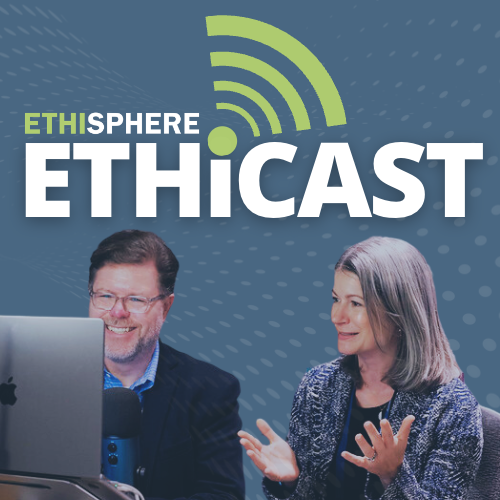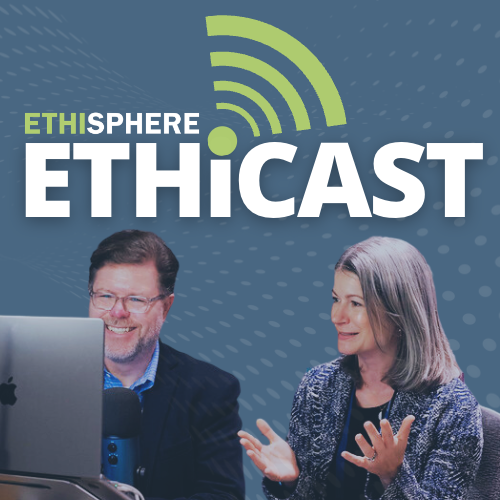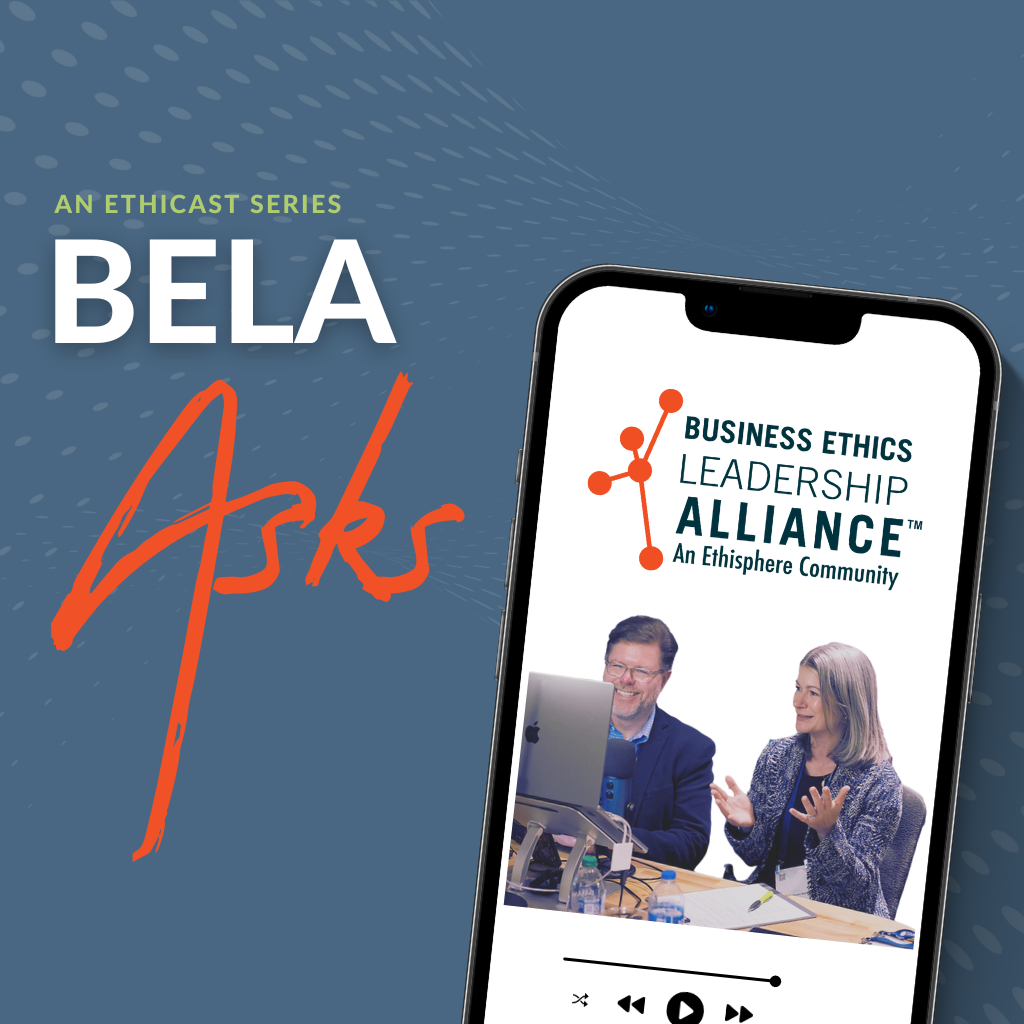[00:00:00] Speaker A: Hi, everyone. Today we'll discuss how Sodexo is taking enterprise wide speakup culture to the next level. I'm your host, Bill Coffin, and this is the Ethicast.
Sodexo is a French food services and facilities management company headquartered outside of Paris, France and operating in 55 countries. With more than 400,000 employees, Sodexo serves 100 million customers each day through its food services operations for hospitals, schools, universities and stadiums, and its facilities management services that includes cleaning and equipment engineering, energy management and environmental services.
In its never ending quest for quality, Sodexo has spent the last few years building up its Speak up program. This campaign is not just an effort to increase reporting rates, but it aims to make systemic improvements to Sodexo's global culture of integrity. The resulting success story is not only reflected by the company's 2024 World's Most Ethical Companies honors, but it provides a deeply compelling example for ethics and compliance teams everywhere.
With us today to share some insights on Sodexo's ongoing Speak Up Culture efforts is Chief Ethics Officer Philip Simons and Head of Group Ethics Program Alexander Berger. Gentlemen, thank you for joining us.
[00:01:26] Speaker B: Thank you for inviting us, Bill.
[00:01:28] Speaker A: Sodexo has undertaken a campaign to bring its Speak up culture to the next level, specifically by moving it past merely having a reporting hotline. Can you talk about what brought you to this decision and the role that data plays in it?
[00:01:42] Speaker B: As you mentioned before, Sodexo is a very large company. We have more than 400,000 employees. So our first challenge when we launched Pickup five years ago was to fulfill the quantitative challenge. It was necessary to have a full coverage of the company and that's what we reach in the first year of the program. And today we have reached this quantitatively objective and we could move to this more qualitative approach. The more qualitative was to invest more in quality, in reputation, in confidence, in professionalism. That's really the big change that we've done. It's also very important to us to have KPIs for that. And we will see during the interview. We have a key KPIs for us, which is the percentage of employees who feel comfortable to report unethical conducts. That's really the qualitative KPIs that we are using. So how did we do that? We have started a number of actions that have been very systematic to improve the way we were doing. Like for instance, a satisfaction survey about the treatment of the speakers, like a strict monitoring of the completion time of the files in this pickup with a KPI which is linked allowed to that.
We have a program to check actively the retaliation situations. We've also a full program, we will come back on that to improve the quality of our investigation through the group. We have more than 300 investigators, so it's a very critical one. And finally the communication is also a very, very important element of that. And Alexandre, some examples of things that they've made strong changes about quality through communication.
[00:03:49] Speaker C: Yes, absolutely. I think as Philippe said, you know, our program was a little bit mature. Now we all have a whistleblowing line in every company. But we ask ourselves what are the next steps? So as Philippe said, all first ideas was to listen the feedback we received from the reporter, what they have, what they would like to hear about us. And one thing was very common about all the satisfaction survey or ET scripture survey we made is people want to understand what is behind speaker. So we launched some short and sweet video named the day I use pickup, the day I blow the whistle. And to demystify what happened when you blow the whistle, what's happened during an interview, how we ask a question, etc. So to ensure confidentiality, of course we make up some detail, but we also use cartoon to make sure that people can share the testimony without showing their face and tell their story about the days you speak up at SODXO and how it contributes to a better journey with these alerts. So it was really, really appreciated by all employees across the organization.
[00:05:11] Speaker B: Absolutely. And the other big action, Alexandre, that we've made was a global action to reduce the average treatment duration. Because we know that one of the elements of satisfaction of the reporters is this treatment time, treatment time that we have decreased strongly. If I remember well, we were around 100 day average when we started Speak up and today we are around 35 days, which is a fundamental change and also a fundamental element of satisfaction to f indeed this pickup. At the next level.
[00:05:50] Speaker A: Can you talk about how you train your investigators? I understand that Sodexo has a Speak up masterclass that establishes a set of professional baselines that is improving your overall Speak up efforts.
[00:06:02] Speaker C: Yes, absolutely Bill. So I think we start with a very minimum standard to define at Sodexo. In a big company like us, you know, what are all investigation policy. You know, it was already the first game changer. You know, in our organization we put everyone around the table, you know, countries function, HR legal ethics, you know, how we can define or stand out about investigating.
Second, we train every case manager on how to Perform an investigation through dedicated learnings, mandatory learning. So we want to make sure that anyone who have to deal with a case, who have access to this platform as an administrators, you know, have been properly trained and know the Sodexo standard on NBC. And third, as you mentioned, you know, last year we start to have what we call Speak up masterclass to have a real concrete scenario, real example, you know, how to deal with a case. Really like situation, you know, like acting role, you know, you have trainers, you know, who plays a role of a whistleblower, who plays a role of a witness, who plays a role of someone who is in the report, you know, doing like misconduct to how to interact with them. So it was very powerful and really appreciated. It was a full day meeting and it was super rich and it was a very safe environment to practice investigation skill. You know, whatever they are, auditors, HR or legal professional.
[00:07:33] Speaker A: What efforts have you made to leverage data accuracy to improve your overall speak up efforts?
[00:07:40] Speaker B: Bill, about data accuracy, I will tell you something about my professional life. When I started my professional life I was marketing consultant and after that I have been marketing director. So it has been for a long time that I been working with data. And I know one thing for sure is that data accuracy depends fundamentally on all the data is created. It's much more about data, about how the data is treated. So we've really made that from the beginning. That means that we really created clear rules about creating the data, communicating and training people. We come back on the same elements as before, communicating, training and after that monitoring what has been done. I will take one example that is very important, another KPI. As you see, we are very fond of KPIs. We have already mentioned several of them. One other KPI is the follow up of corrective actions that are taken compared to the substantiated case. That's something that we follow, that's something that we publish, that's something that we share with the board. So it's a very critical element. And then we have made the full journey to say again, with all the investigators, with all the case manager, how do we have to create this data? What are all the cases? How do we define corrective action and to put everybody on the same line and then to follow up, all the people are filling in the the system and everything. By having correct data at the start, we can really have a very good leverage about data accuracy. So that will be my advice to everybody to say focus your efforts. Because today we have sometimes too much data analysts and not enough People who are really looking for the quality of the data, the primary data at the beginning. So that's really the way we have done it systemically, step by step, sharing the results, sharing the results with the audience, telling the people what has been wrong. And then we really changed the game about data there.
[00:10:07] Speaker A: How do your team's partnerships with sister functions such as human resources and communications help you to achieve your department's SpeakUp goals?
[00:10:18] Speaker B: Look, that's an evidence. Ethics cannot work alone. We always need to work with the other departments. Of course, the collaboration with human research is rather unevident. We have a lot of cases who are related with human resources, with subjects of more than 60% of the case, and a lot of treatments are linked to human resource. So that's an evidence. But I would like to underline another example showing that it's good and possible to work further. And there I'm speaking about the collaboration with supply chain, which is a little bit less evidence if we speak about ethics and more specifically about third party risk management. Because we came rapidly to the conclusion that if we want to have an active third party risk management, we have to do that with the people of the supply chain. So we've made a whole effort with the people of the supply chain to define what are our common territories, what are our common strategy and what are our common actions. So in this way we have defined a strategic approach which is responsible sourcing, completely linked with third party risk management.
We've defined together priorities, we have built together a supplier's code of conduct, so we have an ethical kind of conduct, we have a supplier's code of conduct with a whole process of self assessment for the suppliers so that they can really check their profile. And we have also on site audits. So in that way, by collaborating actively with a department with not evidently an ethical oriental department, we also reach results there. So that's, that's another way of collaborating that we wanted to underline.
[00:12:25] Speaker C: And if you allow me, Bill, I will also add that we have a value at Sodexo which is team spirits. So for example. And we also have another values, which is spirit of progress. And for example, when we talk about whistleblowing program, what we decide last year is to do an external audit to benchmark ourselves with ISO 37002, which is an ISO standard, you know, about whistleblowing system. And it was really also very key for us, you know, because we are not alone to manage our whistleblowing line, to bring everyone across this audit to benchmark ourselves with it. With human resources, with management, with the board to compare ourselves to the best standards that exist in terms of postal blowing. So yes it was very important. I think what is very important with SpeakUp in organization but also I can hear it on the market with those organizations. It is talk to everyone. SpeakUp is maybe one of the well known thing of the ethics and compliance program and you can federate goodwill around SpeakUp because everyone thinks it's a good idea. If someone have a problem they can raise a concern.
[00:13:45] Speaker A: Well Philip and Alexander, thank you so much for speaking with us today and for sharing such helpful and interesting details on all the things that you're doing to advance Speak Up Culture at sodexo.
[00:13:54] Speaker C: Thanks to you Bill.
[00:13:56] Speaker B: Thank you Bill.
[00:13:58] Speaker A: For more on Sodexo's Speak Up Culture and business integrity efforts, please visit sodexo.com and on the main page hit the Corporate Responsibilities tab. For a wide selection of free data points, presentations, webinars and more on SpeakUp culture, please visit the Ethisphere Resource center at ethisphere.com resources if you would like to appear as a guest on this show to share a best practice success story or your own proof point around how business integrity builds value, please visit ethisphere.com ethicast we would love to hear from you. I'm Bill Coffin and this has been the Ethicast. For more episodes please visit the Ethisphere YouTube
[email protected] ethisphere and if this is your first time enjoying the show, please make sure to like and subscribe on YouTube, Apple Podcasts and Spotify. Thank you very much for joining us. And until next time, remember, strong ethics is good business.


